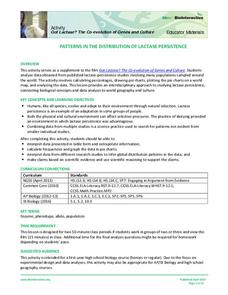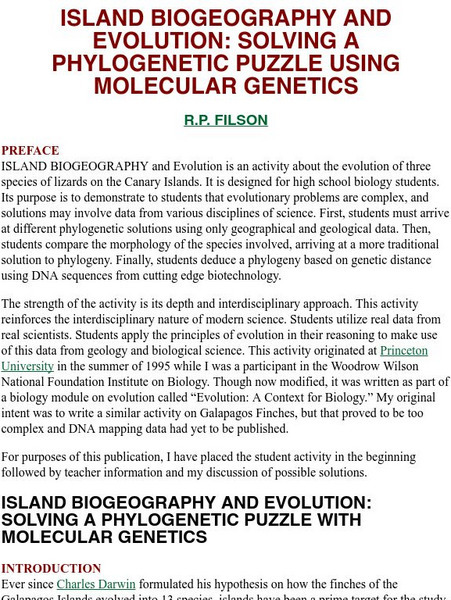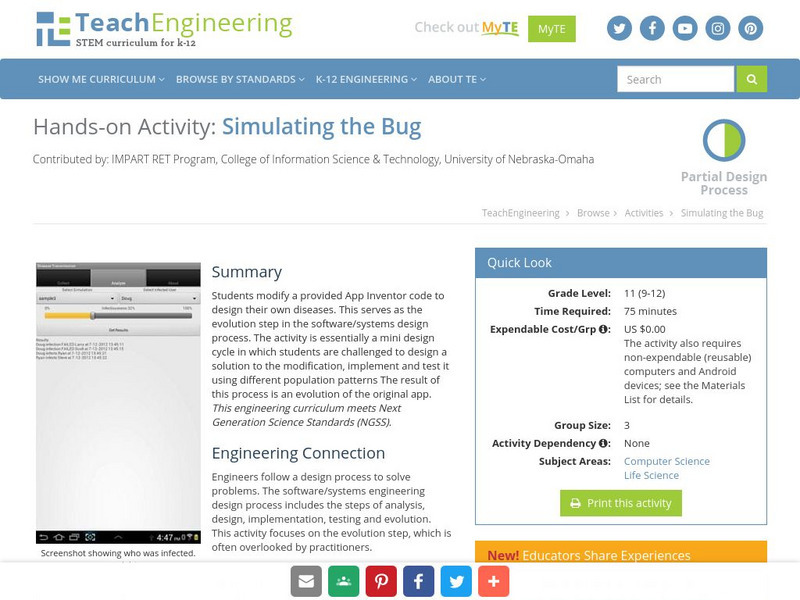Howard Hughes Medical Institute
Patterns in the Distribution of Lactase Persistence
We all drink milk as babies, so why can't we all drink it as adults? Examine the trend in lactase production on the world-wide scale as science scholars analyze and interpret data. Groups create pie charts from the data, place them on a...
Howard Hughes Medical Institute
Fact Patterns: A Film Guide
What does it take to create a scientific theory? Learners attempt to answer the question by studying the work of Charles Darwin and Alfred Russel Wallace. While watching a video, they track observations from each scientist and then look...
It's About Time
Plate Boundaries and Plate Interactions
How does the Earth continually repair itself? Explore the answer to this question, and others, with a unit on plate boundaries and interaction. Pupils classify the types of movement at plate boundaries and identify the...
International Technology Education Association
Make a Pinhole Camera
With a little light and a lot of time, you can create some amazing images. This NASA-related task instructs pupils to build a pinhole camera. The lesson provides suggestions for different pictures to try with the pinhole camera...
Howard Hughes Medical Institute
Zebrafish and Skin Color
You may not know if that zebrafish in your fish tank is a model citizen—but it is definitely a model organism! What can we learn about ourselves from a tiny zebrafish? Discover more about the polygenic trait of skin color through a...
Illustrative Mathematics
How Many _______ Are In. . . ?
Help your learners gain meaningful understanding of dividing fractions using fraction models. The activity includes nine problems which are sequenced to show how the fraction division algorithm evolves. Have learners use graph paper or...
Oregon State
World Map of Plate Boundaries
Young geologists piece together the puzzle of plate tectonics in an earth science lesson. Given a physical map of the world, they search for land formations that indicate the location of different types of plate boundaries.
University of California
Ucmp: Island Biogeography and Evolution
This is a lesson designed by a biology teacher. In it, students use maps and evidence of island age, molecular genetics, morphology, and distance apart to determine how the islands came to be occupied by different species of lizards. It...
Annenberg Foundation
Annenberg Learner: Evolution of Tungara Frog Mating Calls
Use molecular information and observe female response patterns to learn about the mating calls of Physalaemus frogs. Examine the evolution of female preference for particular call characteristics.
PBS
Pbs Teachers:how Does Evolution Work?
Complete a hands-on lab simulation of natural selection to learn how it impacts a breeding population. Perform an online laboratory simulation and examine the interplay between natural and sexual selection in a population.
Khan Academy
Khan Academy: Activity: Human Migration Patterns
Use this activity to figure out where the first humans lived. This activity requires students to read clues and use their understanding of the clues to create a map to give them a visual representation of early humans movements.
TeachEngineering
Teach Engineering: Simulating the Bug
Students modify a provided App Inventor code to design their own diseases. This serves as the evolution step in the software/systems design process. The activity is essentially a mini design cycle in which students are challenged to...











